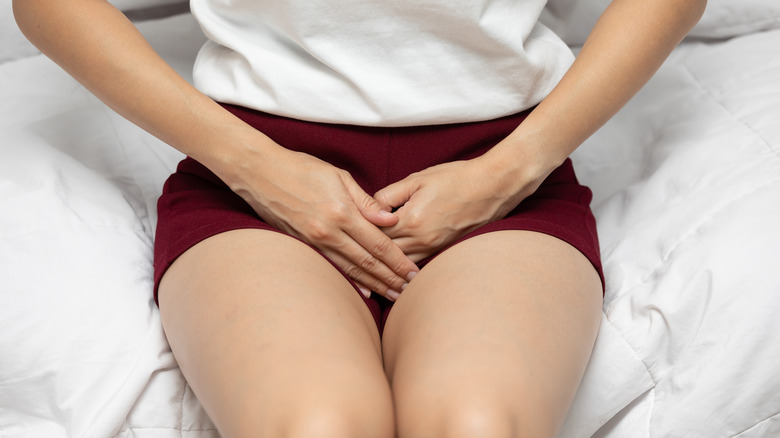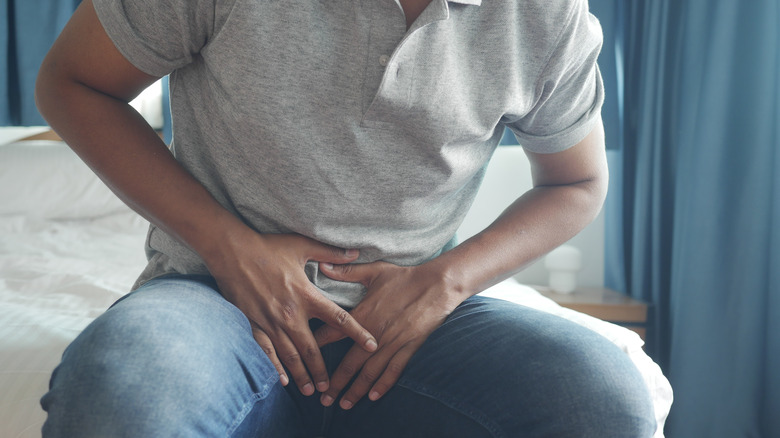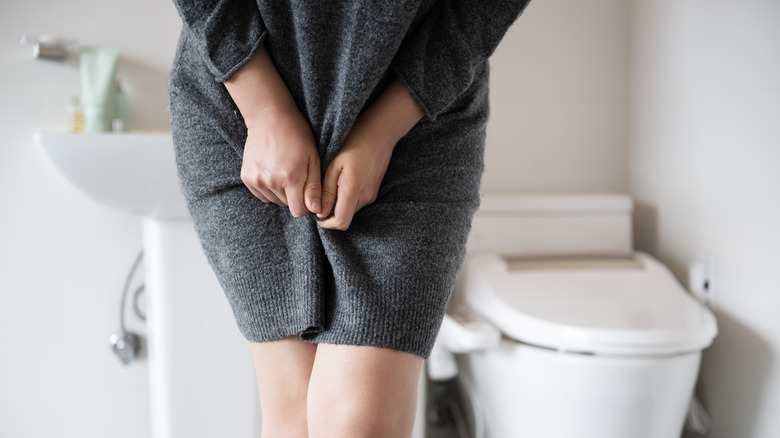When You Have 'Too Much' Sex, This Is What Happens To Your Body
While some might think that you can't have too much of a good thing, it turns out you can. And that concept can even translate to sex. Of course, the International Society for Sexual Medicine notes that there is no right or wrong answer for how much sex two people should be having. As long as both partners are in agreement and satisfied, most people should feel free to have sex as much as they want to.
That said, there is a point where you could actually cross the line into the "too much sex" zone. Vinmec International Health notes that, if sex is beginning to consume your thoughts and interfere with your daily life, then you may be going to the love well a few times too often. Additionally, you could be putting your health at risk, possibly affecting your kidneys and cardiovascular system. And, ironically, you could also be killing your sex drive, as the novelty and amount of satisfaction you derive from sex could decrease the more you have it.
Vaginal inflammation
Prolonged or repetitive sexual activity could take its toll on your vaginal area over time (via Healthline). The friction from sexual penetration, either via the penis or another object, could inflame the vaginal tissue and lead to pain and discomfort in that area. Additionally, if you and your partner decide to use sex toys and they are either not used properly or used without enough lubrication, that could also lead to vaginal soreness and pain.
A big culprit in post-sex vaginal discomfort is vaginal dryness (via Cleveland Clinic). Although dryness is more common as women get older due to declining levels of estrogen, it can happen to women at any age. Approximately 17% of women between the ages of 18 and 50 have reported feelings of vaginal dryness during sex. If left unchecked, dryness can cause burning and itching, bleeding from the vagina, and, over time, a lack of interest in sex. Water-based lubricants can help combat dryness in the short term, but if the problem persists, it's advisable to talk to your doctor to go over your options.
Genital tearing
If you aren't careful, excessive sexual escapades can actually lead to small rips and tears in the genital area (via Healthline). In addition to dryness or a lack of arousal, these tears can also be caused by rough or sudden movements during sex or even uncut nails. While vaginal tears tend to be more common, people can also experience tears of the anus and even the penis.
According to Medical News Today, men can tear their frenulum, which is commonly referred to as the "banjo string." This is a small piece of tissue running from the head of the penis to the shaft. This can be a particularly painful injury, because the frenulum has a number of nerves and pain receptors. However, it usually tends to heal by itself, provided that the area is kept clean and treated well. But if the bleeding is severe or if there are any signs of infection, then you need to seek treatment right away.
Risk of infection
As unpleasant as it may seem, there is a risk of developing a urinary tract infection due to sexual intercourse. According to GoodRx Health, they can be more common than you think due to the fact that bacteria on your skin and rectal area could find their way into the urinary tract. During sex, bacteria can get pushed towards the urethra and the urinary tract and cause an infection to form.
Norton Healthcare notes that women are more likely to develop urinary tract infections than men because of their anatomy. Women have a shorter urethra than men, which makes it easier for bacteria to enter the bladder. In order to prevent infections from forming due to sex, couples should consider urinating both before and after sex to flush out bacteria. Lubricant is also a good idea, as reduced friction can prevent genital irritation, which can lead to infections forming.
Risk of cancer
Shockingly, there is a link between too much sex and cancer. The Canadian Cancer Society reports that human papillomavirus, or HPV, is one of the most common risk factors for cervical cancer. Sexual activity exposes women to HPV, and women who have a lot of sex with multiple partners are at an even greater risk. Additionally, women who are sexually active with men who have had multiple sex partners are also putting themselves at risk of potentially developing cancer.
Results of a 2020 study published in BMJ Sexual and Reproductive Health showed that the rates of HPV infection in women who are sexually active range anywhere from 19% to 49%. Additionally, men who reported having two to four sexual partners in their lifetime saw their risk of developing cancer increase by 57%. Those who had more than 10 sexual partners saw that number jump all the way up to 69%.
Dehydration
A 2013 study published in PLOS One showed that sex can be classified as "moderate exercise." The researchers found that, for most couples, sexual activity was the equivalent of playing a round of doubles tennis or walking uphill. Engaging in this kind of aerobic activity on a regular and repetitive basis without properly replenishing your fluids can leave you feeling both exhausted and dehydrated.
Dehydration can be a big problem when it comes to your sex life, particularly for men. According to Urology of Greater Atlanta, dehydration can cause erectile dysfunction. As your fluid levels drop, your body creates an enzyme known as angiotensin. As angiotensin levels rise, your blood pressure rises in tandem, which can disrupt the flow of blood throughout the body, including to your penis. So, in order to avoid dehydration during sex, be on the lookout for certain warning signs. These include dizziness, thirst, fatigue, or darker urine.
Back pain
Back pain is an unfortunate byproduct of sex, particularly repetitive sex. According to Vinmec International Health, men in particular can suffer from back pain as a result of excessive sex. This is because the movements of sex for men can place heavy strain on the lumbar muscle, which can, over time, lead to back pain. In addition, during ejaculation, both the lumbar and perineal muscles contract, which can also result in post-sex discomfort.
If back pain isn't addressed, it can also make future sex sessions uncomfortable. For people who suffer from back pain, Medical News Today suggests considering some less adventurous sexual positions that may take some pressure off of the lower back. Positions such as side-by-side or spooning may help ease some of the back pain. If you are the one experiencing the discomfort, you could also consider lying on your back and having your partner on top, using a small towel to help keep your spine in a neutral position.
Exhaustion
Most people feel tired after sex, thanks to the various hormones that are released during sex, including oxytocin, endorphins, and dopamine (via Practo). Additionally, other factors can come into play in the bedroom that might leave you feeling wiped out, according to The Health Site. Things like stress, alcohol, and, yes, too much sex without a break can all drain your energy and leave you feeling fatigued.
The post-orgasm hormone release, and subsequent decline, could also leave you feeling a little anxious and maybe even depressed (via Healthline). Sometimes this can be attributed to a condition known as post-coital dysphoria, which can last anywhere from five minutes to up to two hours. Healthline notes that this condition has been experienced by both men and women and is fairly common. If you're feeling anxious, tired, or depressed after a sex session (or several), you can try breathing exercises or asking yourself questions (such as "Am I safe?" or "What is happening right now?") to help keep you grounded.
Penis fracture
Although this is something that happens only in rare instances, thrusting too vigorously or forceful bending of the penis can lead to a "fracture" of the penis. It's important to note that you can't actually break your penis because it doesn't have any bones (via the Mayo Clinic). But what can happen is that the two cylindrical structures inside the penis, known as the corpora cavernosa, can be damaged. The corpora cavernosa are what fill with blood to make the penis erect during sex, and when they experience any kind of trauma, their outer lining can rupture.
According to the Cleveland Clinic, if you experience a penile fracture, you may hear a popping or cracking sound followed by extreme pain. There may also be bruising and swelling around the affected area, and you may see blood in your urine. If it happens to you, you will most likely require surgery, with your doctor repairing the damage to the corpora cavernosa with stitches. You will also likely be out of action in the bedroom for several weeks, so be careful with how much sex you have and how vigorously you have it.
Your immune system could be impacted
On the plus side, having more sex could actually be an immune system booster. According to a 2004 study published in Psychology Reports, college students who had sex once or twice weekly had higher levels of salivary immunoglobulin A than students who had sex less frequently or not at all. Per a 1998 review in Microbiology and Molecular Biology Reviews, salivary immunoglobulin A is a substance in your saliva that can help keep the balance of bacteria in your mouth in check, helping your immune system to fight off germs.
The notion that sex can help boost one's immune system is further bolstered by a 2021 study published in Fertility and Sterility, which showed that sex possibly played a role in protection against COVID-19. According to the study's findings, people who had sex three or more times a month saw their immune systems become able to deal with pathogens more competently and had an overall lower rate of infection than those who had sex less than three times per month.










